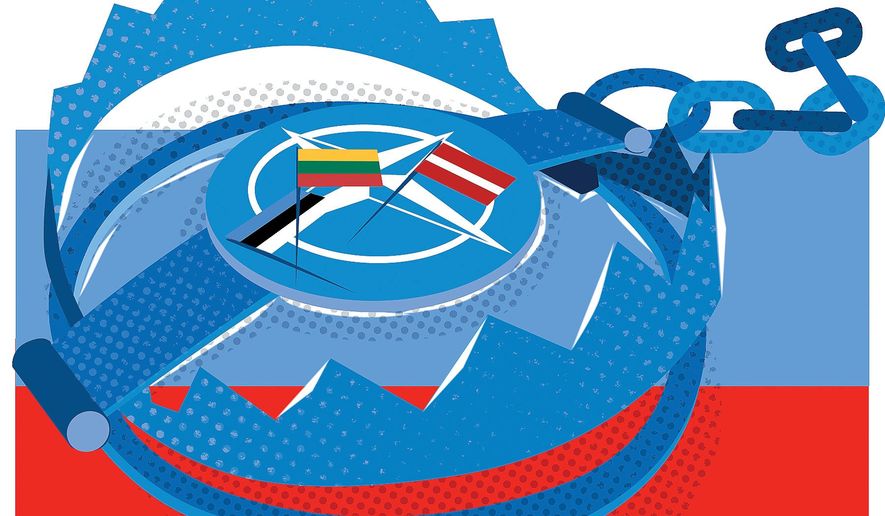OPINION:
President Trump was coy about his commitment to NATO’s Article 5, which considers an attack on one member state is an attack on all. Most informed observers saw this as a bargaining ploy to get the attention of those member states who have not met the NATO defense spending target of 2 percent of gross domestic product (GDP). The administration has since reaffirmed our intention to honor Article 5. Perhaps the most relieved NATO members at this development are the Baltic States — Latvia, Estonia and Lithuania. If any NATO members should be worried about the Russian threat, it is those three.
Those of us who were skeptical about extending NATO membership to former members of the Warsaw Pact had two major concerns. The first was that NATO was overreaching in Eastern Europe. Prior to World War II, the French had extended security guaranties to Poland and Czechoslovakia when Germany was too weak to protest. However, when Hitler called the Allied bluff in the late 1930s, France and Britain realized that there was little they could do to stop Germany if she decided to launch a lightning attack on either eastern nation. Our second concern was that the loss of their eastern possessions would be a festering sore with the Russians for years to come and could be a flash point for future trouble with Russia. The second fear was valid. Many Russians, Vladimir Putin among them, have never accepted the loss of the Baltics and their Russian minority populations any more than they accepted the loss of Ukraine. It remains to be seen whether the first concern will also come to pass.
The NATO expansion ship sailed anyway. NATO now has commitments to its newest members. The question now is how do we honor those commitments if a real crisis occurs? The Baltic states are largely complying with NATO requirements. All have more than doubled their defense spending since joining the alliance and are expected to triple it by 2020. Each state is projected to meet the 2 percent of GDP mark by 2018 suggested by NATO, and demanded by Mr. Trump. However, in 1939, Poland had a robust military; but it was no match for the Germans. The allies could only watch as German and the Russian forces dismembered the hapless Poles before any help could reach them. The allies declared war on Germany, but it was too late for Poland. NATO’s problem is how to deter Russian intervention in any or all of those states.
Vladimir Putin has publicly disavowed a military solution in the Baltic area, but that line was also used regarding Crimea where a trumped-up threat to Russian minorities became the pretext for an invasion that was preceded by military maneuvers on Ukraine’s border. The build-up to crisis is a critical time for NATO to show resolve. Once Russian troops have crossed the border in overwhelming force, the incursion becomes a fait accompli unless the Baltic States in question have been reinforced significantly with enough NATO combat power to threaten a really serious war. This is the point where NATO is weakest. Before a member is actually attacked and Article 5 can be invoked, it takes consensus on the part of all NATO members to move troops under NATO command. That is very unlikely, and this is where American leadership is needed. There will always be weak sisters in NATO who will defer action until it is absolutely necessary. That is why Napoleon liked fighting coalitions.
To reinforce the Baltics during a crisis, some NATO members will need to craft bilateral agreements with each Baltic state to send rapid reaction forces there before a conflict begins. To make this a truly credible deterrent, the United States must be one of the states crafting such agreements. The composition of such reinforcements must be rapid and significant enough to make the Russians realize that they will be involved in a real war if they cross the red line that is a Baltic State border instead of a Crimea-like walkover. Credibility is the essence of deterrence.
In 1939, Hitler accepted the risk that Great Britain and France would go to war over Poland because he knew that he could finish off the Poles before the allies could do anything about it. He hoped that he could then get a negotiated peace once the allies accepted the fait accompli. Today, it is important that Mr. Putin not use that calculus. Peace rests on a credible deterrence.
• Gary Anderson is a retired U.S. Marine colonel and was a special adviser to the deputy secretary of defense from 2003 to 2005.




Please read our comment policy before commenting.